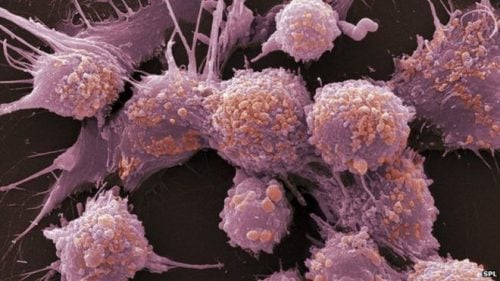A new technique called vascular-targeted photodynamic therapy (VTP) successfully destroys early prostate cancer while avoiding the side-effects associated with surgery.
The technique involves injecting a light-sensitive drug into the bloodstream. After injection, the drug is switched on by laser pulses fired through optical fibres inserted into the prostate.
In the trial reported in the Lancet Oncology journal, 413 participants were randomly assigned either to VTP or active surveillance.
About half of the 196 men who received the treatment showed no signs of the disease two years later, compared with 13.5% of those given standard care.
The trial was conducted across 47 treatment sites in 10 European countries.
Commenting on the results, Mark Emberton, consultant urologist at University College London hospital and lead investigator, said: “These results are excellent news for men with early localised prostate cancer, offering a treatment that can kill cancer without removing or destroying the prostate.
“This is truly a huge leap forward for prostate cancer treatment, which has previously lagged decades behind other solid cancers such as breast cancer.
“In 1975, almost everyone with breast cancer was given a radical mastectomy, but since then treatments have steady improved and we now rarely need to remove the whole breast.
“In prostate cancer, we are still commonly removing or irradiating the whole prostate, so the success of this new tissue-preserving treatment is welcome news indeed.
“The fact that the treatment was performed so successfully by non-specialist centres in various health systems is really remarkable.
“New procedures are generally associated with a learning curve, but the lack of complications in the trial suggests that the treatment protocol is safe, efficient and relatively easy to scale up.
“We would also expect the treatment to be far more precise if we repeated it today, as technology has come a long way since the study began in 2011.
“We can now pinpoint prostate cancers using MRI (magnetic resonance imaging) scans and targeted biopsies, allowing a much more targeted approach to diagnosis and treatment.
“This means we could accurately identify men who would benefit from VTP and deliver treatment more precisely to the tumour.
“With such an approach, we should be able to achieve a significantly higher remission rate than in the trial and send nearly all low-risk localised prostate cancers into remission.
“We also hope that VTP will be effective against other types of cancer. The treatment was developed for prostate cancer because of the urgent need for new therapies, but it should be translatable to other solid cancers including breast and liver cancer.”
Forty per cent of Nigerian men aged about 40 years are living with prostate cancer and many are unaware of their status, an expert recently said.
Ovunda Omudu, head, department of surgery at the Braithwaite Memorial Specialist Hospital, said the disease has killed many due to several factors, including poor awareness, knowledge, ignorance and manpower.
Copyright 2024 TheCable. All rights reserved. This material, and other digital content on this website, may not be reproduced, published, broadcast, rewritten or redistributed in whole or in part without prior express written permission from TheCable.
Follow us on twitter @Thecablestyle

